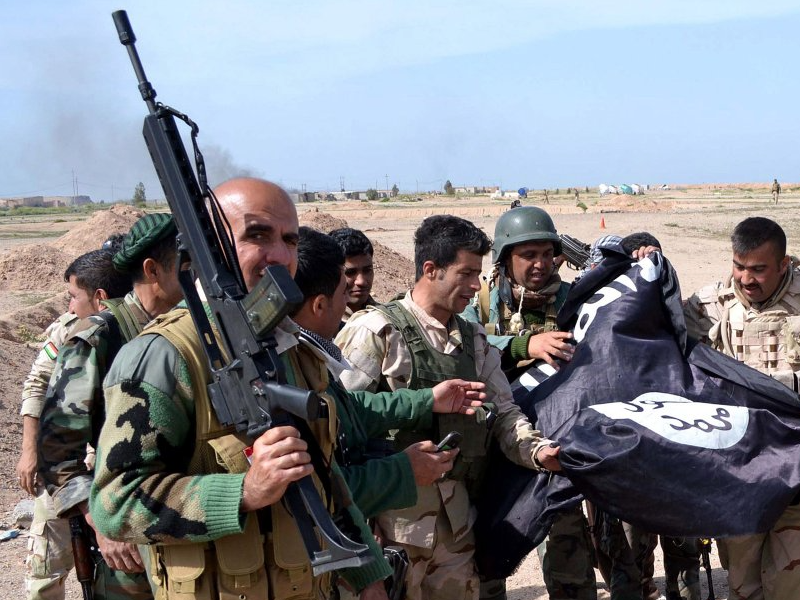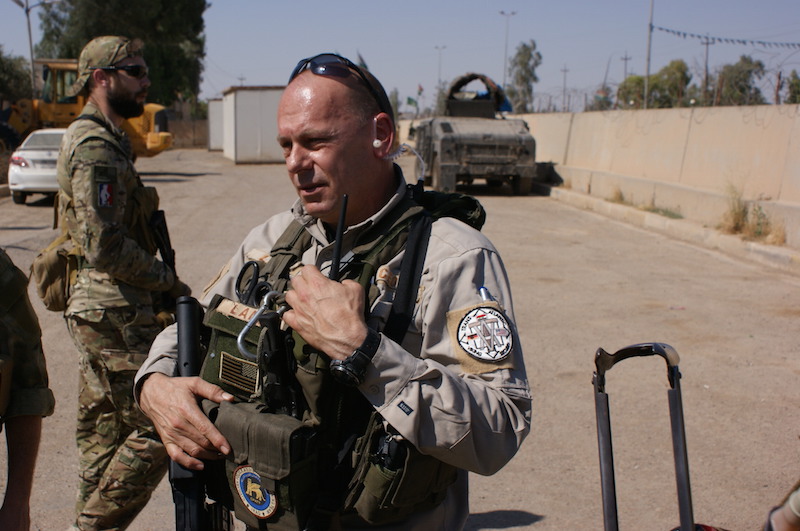Hol Dir den wöchentlichen SPARTANAT-Newsletter.
Dein Bonus: das gratis E-Book von SPARTANAT.

„Das G36 ist beliebt und begehrt“
Herbert Lang leitet seit acht Jahren das Sicherheitsunternehmen Trans Atlantic Viking-Security in Erbil, Nordirak. Er arbeitet direkt in der Krisenregion gegen den Islamischen Staat/Daesh. Im Interview mit SPARTANAT berichtet er über die aktuelle Situation und die Unterstützung der Kurden durch Deutschland. Die deutschen Waffenlieferungen haben sich als effektiv erwiesen und die Peshmerga leisten tapferen Widerstand. Einige Waffen bereiten den Kämpfern jedoch Schwierigkeiten. Auch die Luftangriffe der Koalition auf ISIS zeigen gemischte Ergebnisse. Die Loyalität von Boko Haram zu ISIS stellt eine ernste Bedrohung dar.
Herbert Lang ist Geschäftsführer des seit acht Jahren im nordirakischen Erbil ansässigen Sicherheitsunternehmens Trans Atlantic Viking-Security (TAV) und arbeitet damit direkt im Krisengebiet und an der Frontlinie zum Islamischen Staat/Daesch. In den Nachrichten wird viel über deutsche Unterstützungsmaßnahmen und über den Kampf gegen Daesch geschrieben/geredet. Wir von SPARTANAT wollten von einer Quelle von vor Ort wissen, wie die aktuelle Lage ist. Und wie die Hilfe bei den Kurden ankommt. SPARTANAT Autor Udo Lücken hat das Interview geführt.
SPARTANAT: Herr Lang, viele fragen sich wie hat sich Anfang 2014 eine so aggressive, extrovertierte Bewegung wie der ISIS nahezu unbemerkt bilden und gruppieren können?
Herbert Lang: Die Nachrichtendienste haben das anschwellen der ISIS-Wolke durchaus frühzeitig bemerkt und natürlich umfänglich beobachtet. Die invasive Expansion kam daher nicht so überraschend, wie in vielen Medien fälschlich dargestellt. Trotzdem stimmt es schon, dass die ISIS anfangs als Gefahr unterschätzt wurde. Kaum jemand hat ernsthaft geglaubt, dass deren Aktionen eine so starke Destabilisierung der gesamten Region zur Folge haben könnten.
SPARTANAT: Haben die Unterstützungslieferungen der Bundesregierung an die kurdischen Peschmerga seit September 2014 mit Einsatzfahrzeugen, leichten Waffen und zahlreichen weiteren Ausrüstungsgegenständen Wirkung und damit Entlastung im Kampf gegen den ISIS gezeigt?
Lang: Das ist ganz klar mit Ja zu beantworten. Die ohnehin leicht zu handhabenden Panzerabwehrwaffen der Bundeswehr, wie die MILAN und die Panzerfaust 3, haben an verschiedenen Frontabschnitten wiederholt Vorstöße der ISIS-Miliz gestoppt und sogar zurückgedrängt. Es ist jetzt bei ihnen eine größere Vorsicht und Zurückhaltung beim Vormarsch zu beobachten.
SPARTANAT: Wie ist die Durchsetzungs- und Durchhaltefähigkeit der Peschmerga-Miliz vor und nach der deutschen Ausrüstungslieferung einzuschätzen?
Lang: Die Kurden im nordirakischen Autonomiegebiet sind eine sehr stolze Volksgruppe und es ist für sie eine Auszeichnung bei den Peschmerga-Einheiten kämpfen zu dürfen. Peschmerga -, was frei übersetzt „die dem Tod ins Auge sehen“ bedeutet sind hoch motiviert, trotzdem ist das infanteristische Basiswissen der meisten Kämpfer lediglich als rudimentär zu betrachten. Und obwohl die Lieferung mit Infanteriewaffen eine technische Aufwertung der Kampfkraft bedeutet, ist es dennoch wie ein Tropfen auf den heißen Stein. Ein großer Teil der 500 Milan-Lenkflugkörper und der 1.000 Panzerfaust 3 Patronen ist in den beständigen Abwehrkämpfen bereits verbraucht worden. Hier sollte zügig über weitere, planbare Nachlieferungen seitens der Bundesregierung nachgedacht werden.
Die Ausbildung ausgesuchter kurdischer Soldaten an den Panzerabwehrwaffen in Deutschland hat ihren Wert im Einsatz deutlich gezeigt. Die Ersttrefferquote gegen gepanzerte Fahrzeuge und befestigte Stellungen der ISIS ist sehr hoch und hat das Selbstvertrauen der Peschmerga wertvoll gestärkt.
SPARTANAT: Wie kommen die Peschmerga mit den Gewehren G3 und G36 zurecht?
Lang: Die Milizionäre sind das kompakte und simple AK 47 gewohnt und tun sich in der Mehrzahl mit dem starken Kaliber und hohe Eigengewicht des G3 etwas schwer. Gegenteilig das G36. Dieses moderne Sturmgewehr ist sehr beliebt und entsprechend begehrt. Es wird nur an ausgesuchte, erfahrene Kämpfer weitergegeben. Jedoch halten viele kurdische Soldaten irrtümlich das Reflexvisier für einen aktiven Laser und beschweren sich entsprechend über den vermeidlichen Defekt. Hier müsste die Ausbildung der Bundeswehr bei den Multiplikatoren länger dauern und nachsteuern.
SPARTANAT: Gibt es vor Ort eine Zusammenarbeit mit TAV – im Bild oben: Appell am TAV Stützpunkt mit Standeskontrolle bei den Fahrezeugen – und der Bundeswehr?
Lang: Wir halten engen Kontakt zu den zuständigen Stellen und unterstützen schon jetzt nach Kräften. Parallel gewährleisten unsere deutschen PSD-Teams seit Jahren mit einer großen Flotte an sondergeschützten PKW und sogar Bussen, den Personenschutz für Koalitionstruppen und den irakischen Streitkräften im Gesamt-Irak. Wie wir wissen wird die Bundeswehr die Unterstützungsleistungen für das bald zu erwartenden Ausbildungskontingent im Nordirak ausschreiben. TAV-Security hat die nötigen Voraussetzungen, sieht sich einer solchen Herausforderung gewachsen und wird an der Ausschreibung selbstverständlich teilnehmen.
SPARTANAT: Warum zeigen die permanenten Luftangriffe der Koalitionskräfte gegen die ISIS-Verbände kaum nachhaltige Wirkung?
Lang: Die stark aufgesplitterten und hochmobilen Einheiten des ISIS sind aus der Luft nur schwer zu identifizieren und verschanzen sich oftmals in Dörfern, Ortschaften und Städten mit den Bewohnern als Schutzschild. Die US-Luftwaffe vermeidet ganz bewusst Kollateralschäden unter der Zivilbevölkerung. Im Zweifel brechen die Piloten lieber den Angriff ab. Gerade in eng bebauten Ortschaften wie z. B. Mosul ist das ein großes Problem. Hier können die Flugzeuge lediglich die Bodentruppen auf konkrete Ansage oder nur im Umfeld der Ortschaft unterstützen.
SPARTANAT: Wie ist der „Treueschwur“ der Boko Haram Gruppierung in Nigeria an den ISIS einzustufen?
Lang: Das ist reiner Pragmatismus. Die Boko Haram wollen auf einer Aufmerksamkeitswelle mitschwimmen. Trotzdem sollte man diese Gruppierung als ernste Bedrohung für den fragilen Frieden in der Region betrachten. Ihre Operationen haben Signalwirkung und könnten die Initialzündung einer größeren Revolte werden. Die kriegerischen Stämme der Sahelzone sind ohnehin in einer Art Orientierungsphase und suchen eine Leitfigur. Ein charismatischer Führer hätte jetzt, auch unter der Fahne des ISIS, leichtes Spiel.
Text: Udo Lücken – Fotos: TAV – Das Interview ist zuerst im „Newsletter Verteidigung“, Ausgabe 11/2015 erschienen. Abdruck mit freundlicher Genehmigung des Autors und von NV.
SPARTANAT ist das Online-Magazin für Military News, Tactical Life, Gear & Reviews.
Schickt uns eure News: [email protected]
Werbung
Hol Dir den wöchentlichen SPARTANAT-Newsletter.
Dein Bonus: das gratis E-Book von SPARTANAT.



